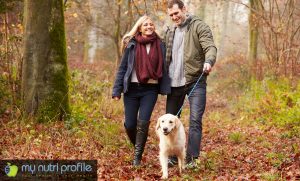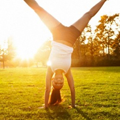
Walking back to Happiness

When it comes to health, following the paths that we evolved with allows our bodies and minds to function in ways they were designed to function. As such, our most natural movement and circulation are fundamental to how well we can feel; not just fit, but energised, motivated, alive and joyous.
Here at My Nutri Profile, our aim is always to address the underlying causes of health conditions and a sedentary lifestyle is known to be one of most detrimental lifestyle factors to all aspects of health.
Exercise is fundamental for our immune systems, regulation of cholesterol, blood pressure, heart function, mental function, management of stress hormones etc. The “etc” here really does mean everything that your body does and its regulation of all functions. It is constantly trying to get you back to a resting state where everything is within “normal” parameters, like blood pressure, blood sugar levels, the pH (slightly alkaline) of your blood. It is when it finds difficulty reaching this point of homeostasis (staying the same) that the real problems occur and when symptoms begin to show; for instance, an inability to cope with stress often shows up in symptoms like irritability, insomnia, energy slumps, loss of concentration and depression. You can see here that the body is struggling to get back to a balanced functioning state. It will also be using up lots of nutrients and may be damaged by elevated levels of stress hormones.
Healthy exercise can help the body cope with the stresses of life. Physiologically, your body still believes that you are that hunter-gatherer type and so responds with the “fight-or-flight” mechanism; this primes you to be ready to either run away or stand and fight an opponent or predator. You can probably feel these things happening; blood pressure rises to pump nutrients and energy to muscles that tense, pupils dilate to see better, blood thickens to heal wounds more quickly, circulation is diverted away from the digestion and skin (not considered vital in this circumstance) and sugar is released from stores in the liver to the blood for energy. If we have the stress without the physical exertion the body expects in this circumstance, all the sugar, energy and hormones do not have the natural conclusion of being used up. Instead, the body has to use up more nutrients and energy bringing down these levels to its resting state. This can become more and more difficult the more the stress continues and symptoms can arise.
All this occurs as adrenaline is raised, the very substance that people get a taste for when they exercise intensely and regularly. The modern gym mentality where people live very sedentary lives and then suddenly shock the adrenal glands into action is not how we are designed to live. Getting back to how and when the body wants to move naturally can help your body to cope with stress effectively and have further reaching consequences.
Walking is the best way to improve lower body, reproductive and digestive circulation; in fact, any activity that moves the whole body around is beneficial, although cycling can restrict the pelvic area. Physiologically we are designed to walk to get the whole circulation moving and it should be regular, in short doses throughout the day. The lymphatic system does not have a pump like a bloodstream and the heart, and relies on your movement, which is, therefore, an important part of supporting your immune system. The naturopath Marion Kirkham1 states “It is the avoidance of being sedentary which is vital; so those who sit at their desks, then lie on their sofa and then go to the gym several times a week are not helping their circulation. This is inconsistent and unnatural.”
The US Surgeon General has recently recommended 10,000 steps per day, but although this is known to be an arbitrary number that a Japanese pedometer company picked to sell product in the 1960s, it is still widely recognised that a minimum of 2 miles a day will keep your circulatory system in working order and 3-4 is optimal where possible. If a person has trouble walking, passively helping the circulation can be difficult, but there are good machines available that can move the legs and stimulate the circulation whilst sitting or lying.
We have large muscles in the legs that are designed to support our posture, especially the calves and thighs. This is another reason why walking is so important, active calf muscles help pump blood back up from the lower body, back to the heart. Being truly non-sedentary means moving around all the time, as Spontaneous Daily Activity (SPA). Sitting down for more than an hour is defined as sedentary, when metabolism slows and risk factors for diabetes, heart disease and back pain rise. If you work at a desk, simply getting up and moving your whole body around for a few minutes can make a surprising difference to your health.
Your pelvis is supposed to move in harmony with your chest and ribs and walking creates a very natural movement and helps to avoid conditions such as constipation, infertility, prostrate problems and endometriosis. Part of the reason is that good circulation is necessary to deliver nutrients to the places in the body where they are needed and used; a sedentary life can help cause and exacerbate deficiencies and symptoms.
Paul Chek HHP NMT states in his article The Power of Walking2, that walking is “one of the most primal movements known to man. Because bipedal walking became essential to our survival …….., our bodies have developed in such a way that walking and movement are essential to health; as they say, form follows function”.
He describes several key benefits from walking that will increase all-round health:
- Increases enzyme activity and other metabolic activity, so you use up more calories and draw in nutrients from food and supplements.
- Supports peristalsis, the movement of food through the digestive tract and helps to prevent constipation.
- Increases the desire to drink water, helping detoxification and digestion.
- Helps mental function by nourishing the nervous system.
- Synchronises breathing with movement, fully oxygenating the body.
- Keeps the internal organs mobile and healthy.
- Emotional wellbeing; when a body is sluggish, so is the mind.
Like all good therapists Chek recognises the importance of linking the physical with the emotional; when we behave as naturally as possible, our bodies reward us with feel-good chemicals like endorphins, as we are essentially promoting the survival of the species. He says “Uneven terrain stimulates the use of many different movement patterns, further assisting in massaging of organs, pressure changes and increased circulation.” So getting out of towns and onto the natural ground will reward much more than just your sense of adventure!
Adding more movement into your daily life
We simply know that we feel better when we move around and use our muscles, limbs and breath to their full capacity. We want to reiterate that exercise and particularly walking, is a fundamental part of our basic wellbeing. If you want to look after yourself then make sure you eat well, take supplements you need and treat your body as a friend.
The old and maybe obvious advice remains true; don’t take the lift, take the stairs, get off the tube or bus one stop earlier, get a dog, make walking a regular before-work activity, don’t drive when you could walk. 10,000 steps are really not that much in the course of a day; in total it probably takes under an hour – very little for the free benefits you get and you certainly should not be sitting on your behind for the rest of the 15 hours that you are conscious. You can imagine the effort the circulation would have to make without a helping hand from the motor activity – really a losing battle.
So buy a pedometer, they can cost as little as £10 (you don’t need a fancy one!) and the actual counting of how many steps you have done can really spur on motivation. If you do not breathe naturally through your nose or have shallow or difficult breathing, learn yogic or pilates techniques to help you and practise these whilst walking; very good for bringing down stress levels.
Supplements to support ease of movement:
- Lamberts Multiguard – a great all-round multivitamin & mineral for the B vitamins and magnesium needed to support the energy production we need to get motivated to move. http://www.revital.co.uk/lamberts-multi-guard-90-tablets-579
- Solgar Fish Oil Concentrate 1000mg – omega 3 oil for joint and anti-inflammatory support, for those for whom movement is painful or who exercise a lot. http://www.revital.co.uk/solgar-fish-oil-concentrate-120-soft-gels-1000mg-28386
- Minami Nutrition Vegan DHA – a vegan version of direct DHA, the form of omega 3 also found in fish oils. http://www.revital.co.uk/minami-nutrition-vegan-dha-orange-60-soft-gels-orange20565
- Revital Collagen Type 2 – support for the maintenance of smooth working of joints. http://www.revital.co.uk/revital-collagen-type-2-90-capsules-16101
References:
1. Biocare Seminar “Circulation” with Marion Kirkham ND.
2. www.chekinstitute.com, article Chek, P “The Power of Walking”




